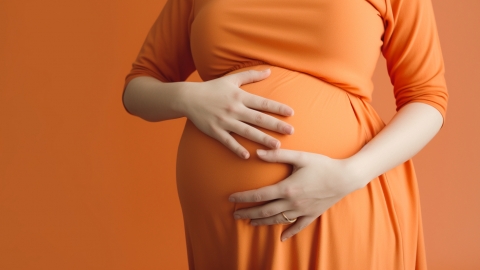What causes pain after urination in late pregnancy?
Stabbing pain in the lower area after using the toilet during late pregnancy may be caused by fetal pressure, poor local blood circulation, vulvovaginitis, urinary tract infection, or perianal eczema. Symptoms can be improved through posture adjustment, proper hygiene, and medication. If the pain persists or worsens, or is accompanied by bleeding or pus discharge, prompt medical attention is necessary.
1. Fetal pressure: In late pregnancy, the growing fetus compresses the pelvic cavity and perineum. Increased abdominal pressure during toileting intensifies this compression, causing stabbing pain, which typically eases after standing up. It is recommended to use a seated toilet, shorten defecation time, and avoid prolonged squatting or standing to reduce local pressure.
2. Poor local blood circulation: Reduced physical activity during pregnancy slows blood flow in the perineal area. Changes in abdominal pressure during toileting can stimulate this region, leading to pain. Moderate walking is advised to improve circulation, along with wearing loose, breathable cotton clothing and avoiding tight pants that restrict blood flow.

3. Vulvovaginitis: Hormonal changes during pregnancy reduce vaginal resistance, making it easier for bacterial or fungal infections to cause inflammation. Wiping after toileting may irritate the affected area, resulting in pain, itching, and abnormal discharge. Under medical guidance, medications such as clotrimazole suppositories, metronidazole suppositories, or Hongke Fuyin Wash Solution can be used to relieve symptoms.
4. Urinary tract infection: In late pregnancy, the ureters are compressed, increasing susceptibility to bacterial invasion of the urinary system. Inflammation of the urethra causes pain during and after urination, often accompanied by frequent and urgent urination. Under a doctor's supervision, medications such as amoxicillin capsules, cefaclor capsules, or Sanjin tablets may be used to alleviate discomfort.
5. Perianal eczema: Moisture and inadequate hygiene around the anus during pregnancy can lead to eczema. Friction from stool and wiping during toileting irritates the affected skin, causing pain, itching, and redness. As directed by a healthcare provider, calamine lotion, zinc oxide ointment, or Kushen Wash Solution can help improve symptoms.
Maintain cleanliness and dryness of the perineal area. Wash with warm water after bowel movements and avoid vigorous wiping. Eat a diet rich in dietary fiber, drink plenty of water, maintain regular bowel movements, and minimize local irritation.





